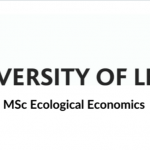Ecological Economics | University of Leeds
Many of the most serious environmental and social problems that we face can be traced to root causes in our economic system. On this programme, students develop an understanding of how economic activity gives rise to environmental and social problems, and learn innovative tools to tackle these problems.
How does the programme provide content to ensure students achieve an understanding of a reasonably diverse set of perspectives on understanding economies?
The MSc Ecological Economics programme combines ecological and environmental economics modules from the School of Earth and Environment, with pluralist economics modules from the Leeds University Business School. Options on the programme range from a critical introduction to macroeconomics, through to behavioural economics, well-being economics, and the global financial system.
How does the programme ensure students understand the interaction between economic and ecological systems?
The focus of ecological economics, and thus of the MSc Ecological Economics programme, is the interaction between the economy and the environment. The fundamental idea of ecological economics is that the economy is a subsystem of the biosphere. Ecological economists analyse problems -- not just in terms of the flow of money -- but also in terms of biophysical flows and social outcomes.
The University of Leeds is home to the largest group of ecological economists in the UK, and one of the largest and most-renown groups of ecological economists in the world. Besides taking modules in ecological and environmental economics, students are also able to take a wide range of sustainability modules including climate change mitigation, sustainable business, and environmental policy and governance.
How does the programme ensure students understand how to critically explore real-world evidence, both qualitative and quantitative?
The programme reflects a new approach to teaching economics that focuses on real-world problems and integrates a wide range of different perspectives. Students are required to take a core research methods module which introduces both quantitative and qualitative methods.
Other core modules on the programme cover methods such as:
- system dynamics;
- agent-based modelling;
- input-output analysis
- multi-criteria analysis; and
- cost-benefit analysis.
What pedagogical approaches does the programme use to ensure that students examine the historical context, assumptions and values in all economic thinking?
The programme is very focused on encouraging critical thinking, and many of the assignments are designed around this goal. These include assignments such as:
- writing an opinion-editorial piece, which may be published in our online student journal; and
- developing a policy brief on a solution that could help achieve a sustainable economy.
How does the department ensure that the teaching culture and capacity to deliver economic pluralism are continually improving?
We continuously review the programme, and have been expanding the range of topics offered through optional modules.
Other information:
The programme is ideal for students with an interest in economic issues, with a focus on their social and environmental consequences. Students do not need to have completed a previous degree in economics to undertake the programme.
Country:
United Kingdom
University:
University of Leeds
Course name:
Ecological Economics
Department/school:
School of Earth and Environment
Course level:
Taught Masters
Course language:
English

 all programmes
all programmes